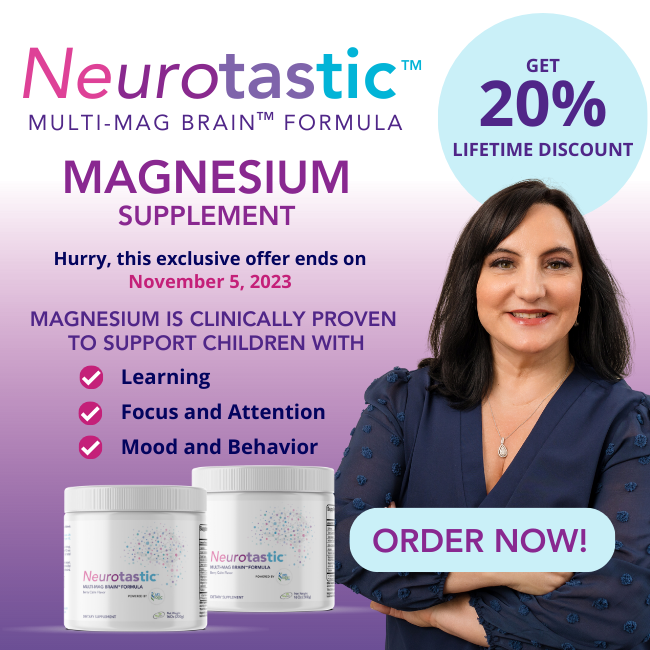Contrary to the common notion that focus issues are exclusively tied to ADHD, emerging research underscores the critical role of magnesium in cognitive function. Low levels of magnesium have been shown to profoundly affect focus, learning abilities, and impulse control in both children and adults.
Magnesium, an essential mineral, plays a vital role in numerous physiological and neurological processes, making it a compelling avenue for addressing attention and focus challenges beyond the scope of ADHD. Studies have begun to shed light on how magnesium deficiency may manifest as attention difficulties and cognitive impairments, paving the way for a deeper exploration of this mineral's potential in enhancing mental wellness and focus.
And as we aim to explore safe and scientifically-backed natural solutions for enhancing focus and mental well-being, we will focus on magnesium's benefits for individuals with ADHD.
Magnesium supplementation for ADHD symptoms, treatment and management.
Scientific evidence strongly suggests that low serum levels of magnesium are linked to ADHD. This crucial information warrants widespread sharing and dissemination, especially among those caring for individuals with ADHD. Understanding the association between magnesium levels and ADHD prompts the important question of why magnesium levels aren't routinely checked in individuals with ADHD.
Magnesium plays a key role in this by aiding neurotransmitter regulation, dispelling the misconception that only pharmaceutical interventions can positively impact brain function. Natural strategies such as proper nutrition, physical exercise, PEMF, and neurofeedback also contribute to neurotransmitter regulation, emphasizing the importance of exploring safe and natural options.
The recommended intake is up to bowel tolerance, but consulting a healthcare provider and choosing the right kind of magnesium supplement is essential. Fortunately, Multi-Mag brain formula is a reliable source of magnesium, containing magnesium threonate and glycinate, a form rarely found in other supplements due to cost and dosage challenges. You can read more about magnesium threonate and glycinate here. Click here.
The benefits of magnesium for ADHD are backed by clinical evidence, demonstrating its effectiveness in reducing hyperactivity, inattention, impulsivity, and impulsive behaviors. It has also been shown to help reduce restlessness and aggression resulting in improved sleep quality as it provides a calming effect on the body, aiding in emotional regulation and mood support which then leads to reduced sleep disturbances.
Magnesium's role in brain function and learning.
Magnesium supplementation is advocated for people of all ages, including children, due to its essential role in brain function. That is why it is essential to have magnesium readily available and accessible in every household, as it is a vital nutrient for overall well-being, particularly brain health.
Magnesium also contributes positively in brain functioning and learning by regulating essential brain chemicals and communication systems, facilitating focus and enhancing the learning process in children. It positively impacts NMDA receptor modulation, crucial for proper cognitive functioning, attention, and learning abilities and supports synaptic plasticity, ensuring optimal flexibility and balance in brain activity, ultimately aiding in attention and learning.
Furthermore, magnesium exhibits a notable crossover into the realm of neurofeedback by influencing brainwave regulation. While neurotransmitters often take center stage in discussions about brain health, understanding and addressing brainwave communication are equally significant.
Research has demonstrated that many children facing learning challenges have issues with brainwave communication, which is why magnesium is essential as it improves brain communication and connectivity. This underscores the role of magnesium in enhancing brain hubs and supporting brainwave regulation, ultimately benefiting cognitive function and learning processes.
Remember that seeking professional guidance, staying informed through blogs and research, and taking the initiative to start supplementing with magnesium are encouraged steps for enhancing mental health and addressing ADHD symptoms.
To learn more about magnesium and its benefits, you can check out the following blog posts:
● Magnesium and how it reduces hyperactivity and impulsivity in kids.
● 5 surprising ways magnesium helps adhd, anxiety, OCD and depression
● Natural Solutions for Children's Behavioral and Mental Health
● Cognitive enhancers for ADHD









